June 3, 2025 | 07:39 GMT +7
June 3, 2025 | 07:39 GMT +7
Hotline: 0913.378.918
June 3, 2025 | 07:39 GMT +7
Hotline: 0913.378.918
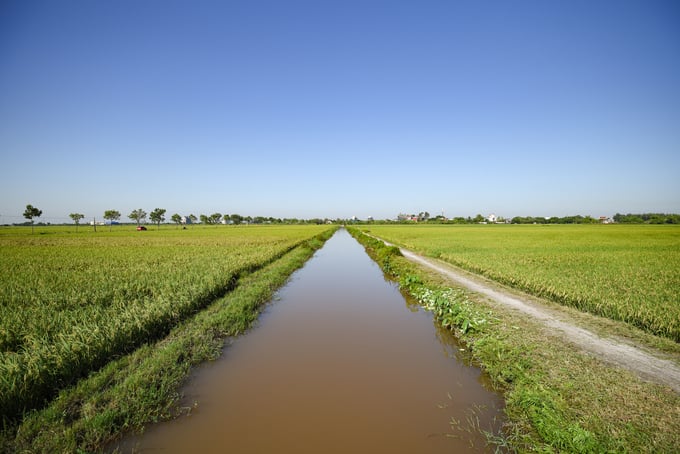
Water, fertilizer, efforts, and seeds are four important inputs to agricultural production. Photo: Tung Dinh.
Water, fertilizer, efforts, and seeds are four important inputs to agricultural production. Now when working as farmers, in addition to caring about these 4 factors, people also care most about whether they can sell the products they make or not? How to sell? And if they can sell them with a good price? So people now only trust the one who tells them how to sell products rather than caring about how to produce them.
But if you want to sell products, you also have to change your thinking about farming. Farming aims are no longer just production for food, savings, and small exchange, but now also includes the plan to increase the value of production and turn it into agricultural economics. So from agricultural production thinking, farmers also gradually shifted to agricultural economic thinking.
Agricultural economic thinking, so what do farmers need?
Agricultural land is a means of production that farmers are assigned by the State according to the quota of each type of land and region. They can also receive transfers from other households and individuals engaged in agricultural production. Those who want to expand production will receive support from the government to consolidate land and exchange plots, build large sample fields and in the near future will be able to concentrate and accumulate agricultural land according to the 2024 Land Law recently passed by the 15th National Assembly and will take effect from January 1, 2025.
When farmers have their own land, they want the land to be free to change crop structure, such as from growing rice to growing other short-term food crops (corn, beans, peanuts...) or switching to growing fruit trees. This has been encouraged by the Law on Crop Production and a number of Government Decrees to increase land use efficiency.
According to information from the Ministry of Agriculture and Rural Development, in 2023, some models of crop restructuring on rice land have brought high efficiency, such as: annual crop models such as the model of 1 peanut crop - 2 onion crops/year has brought an income from VND 150 - 200 million/ha/year; The lotus growing model has an average yield of 20-22 tons/ha, equivalent to VND 100-110 million/ha, with an income 3-4 times higher than rice growing (Nghe An, Thanh Hoa... ); The model of growing spice plants (Chinese coriander), chili plants, flower plants... gives a total income of about VND 250-310 million/ha/year, profits from VND 150-200 million/ha/year (Turmeric An, Thanh Hoa, Tien Giang...); perennial tree planting models such as the medicinal cajuput tree model (Long An province) give income from VND 60-90 million/ha/year; models of growing guava, orange, banana, grapefruit, durian... (Tien Giang, Ben Tre, Vinh Long...) bring income from VND 300-600 million/ha/year; model of one rice crop - one shrimp crop in the Mekong Delta, giving an income of VND 400-500 million/ha/year.
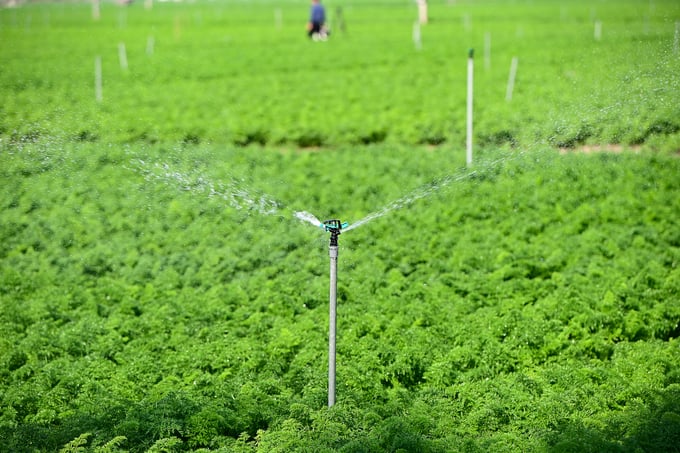
According to ancient beliefs, water and fertilizer are the two leading factors in farming. Photo: Tung Dinh.
When the farmers changed the crops, they still want guidance on what crops to plant on the land accordingly, and want support to sell crop products. This requires the Ministry of Agriculture and Rural Development to soon issue production processes suitable for the farming terrain of sloping land, lowland land, acid soil, saline land...) as stated in the Law on Crop Production.
Recently, the government has paid attention, invested, supported, and optimized the production of products, but what the farmers need is to be able to trade the products. If they want to sell, they must produce according to market requirements, not just produce and then sell to the market according to their wishes. Market production is production according to the needs of buyers.
So we need to solve the story of what do buyers need? They need safe production, quality certification, traceability, and also responsible production... For this, the State needs to support people with information (need to guide the farmers and have data on cultivation, as well as digital data if available).
Water for agricultural production has been regulated in the Irrigation Law and guiding documents (Decree 96/2018/ND-CP detailing the prices of irrigation products, services and support money for using public irrigation products and services). Currently, the farmers directly involved in basic agricultural production are exempt from irrigation fees. With the current irrigation infrastructure, they can already feel secure in their production.
However, along with climate change and the farmers' production habits, in many agricultural production areas farming is experiencing local water shortages (regional droughts) or water quality problems to suit each plant types also need attention and resolution.
Fertilizers and pesticides are important supplies for farming. Both of these materials are regulated in two legal documents: the Law on Crop Production and the Law on Plant Protection and Quarantine.
According to the 2018 Law on Crop Production and its guiding documents, organizations and individuals who want to produce fertilizer for sale must research (or have research results) and conduct testing (recognized by a testing organization) except for organic fertilizers, carry out procedures for the State to recognize circulating fertilizers, prepare conditions for fertilizer production (the State recognizes eligibility for fertilizer production), fertilizer production must be declared conformity with regulations (procedures for declaration of conformity); fertilizer stores and fertilizer sellers must also be qualified and granted certificates.
The same progress applies to plant pesticides, their production, sales and use are also specifically and clearly regulated in the Law on Plant Protection and Quarantine and its guiding documents. These regulations have contributed to strictly controlling and ensuring the quality of fertilizers and pesticides when released into the market, thereby limiting counterfeit and poor quality goods.
So what do farmers need in terms of fertilizers and pesticides? In order for them to be cheap and still effective.
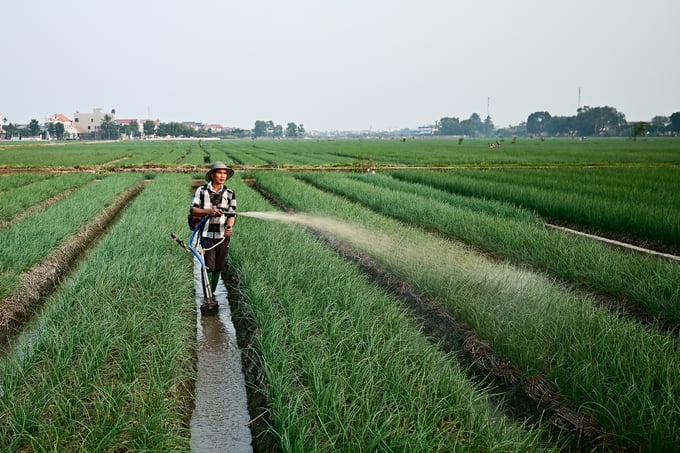
Currently, farmers are in need of cheap and effective fertilizers and pesticides. Photo: Tung Dinh.
Fertilizer prices will directly impact the cost of agricultural products, accordingly, cutting production costs, including regulatory compliance costs, will also contribute to reducing product prices and input costs for production.
Each requirement and condition that a fertilizer production enterprise must fulfill is included in the product price. Therefore, it is necessary to continue reviewing business conditions and administrative procedures in this field to ensure both management goals and the goal of supporting and promoting production and business in agriculture.
The recent growing process shows that farmers often use fertilizer more out of habit than according to the manufacturer's instructions and have a need to use a lot of fertilizer in the hope that the plants will be good and bear fruit.
The agricultural sector has organized agricultural extension to help farmers understand and use it correctly, but it is necessary to continue to guide, orient, and support them to change their fertilizer use habits towards organic, ecological production and sustainable development.
Organic fertilizers, organic pesticides and farming techniques also need to be invested and developed, especially in the face of the risk of climate change happening every day and every hour. At the same time, the Ministry of Agriculture and Rural Development needs to organize an investigation and assessment of beneficial biological resources to take appropriate protection and exploitation measures; as well as to issue a list of useful species and strains of organisms used in farming, contributing to achieving the goals of circular agriculture and green agriculture.
Agricultural production efficiency depends on farming techniques and production organization. Recently, the State has organized agricultural extension for farmers, supported and guided production and farming processes, and initially supported agricultural mechanization, but the actual scope and effectiveness have not yet been achieved as desired.
The habit of producing according to experience and intuition still remains. And in addition to diligent labor in agricultural production, people need to have love for agriculture, crops and crop products. Only when there is no distinction between products made for eating and products made for sale can consumers be completely assured of quality, this also contributes to boosting product demand.
According to the Law on Crop Production and its guiding documents, plant varieties are an input factor in production that are managed and supported so that people can feel secure in using good, quality seeds. The Law on Crop Production has changed the way plant varieties are managed. Accordingly, the State only cares and regulates the management of new varieties of main crop species, specifically 06 species: Rice, corn, orange, grapefruit, banana, and coffee issued by the Ministry of Agriculture and Rural Development; these species must be recognized for circulation by the State before they can be produced and traded.
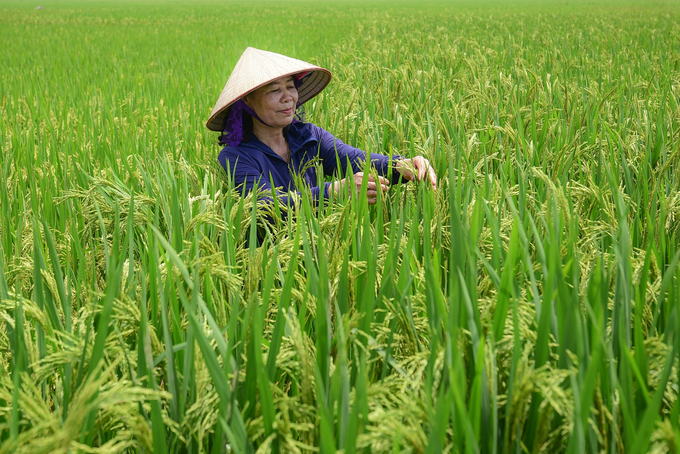
Vietnamese farmers are always diligent and hard-working in the fields. Photo: Tung Dinh.
Organizations and individuals researching new varieties must conduct testing according to the provisions of Standards and Technical Regulations; and must be recognized by the State for seed circulation; seed production must have conditions (specified in Vietnam Standards - TCVN, QCVN); As for seed trading, there must only be a legal transaction location and guaranteed traceability of the plant variety lot. The plant variety management process is based mainly on standards and technical regulations issued or advised by the Ministry of Agriculture and Rural Development.
Thus, deciding which plant varieties to manage, is within the decision-making authority of the Ministry of Agriculture and Rural Development when determining which plant varieties are the main ones to be managed and the content of the standards and technical regulations when applying. Therefore, in the coming time, it is necessary to fully promulgate TCVN and QCVN and at the same time review the list of main crops and requirements in the issued TCVN and QCVN.
For plant varieties that do not belong to the main crop species, people carry out the procedures for self-declaration of circulation (simple procedure) and the Department of Crop Production makes it public on the Department's website.
For indigenous varieties and long-standing specialties, localities will request special recognition from the Ministry of Agriculture and Rural Development for common use by the people.
Currently, the structure of our agricultural plant varieties is very diverse and of good quality, but whether it is enough to serve agricultural economic development requires an overall assessment. In the structure of plant varieties, the rice seed set has received investment attention and has contributed greatly to the development of the rice industry in recent times.
The seed factor in many cases is considered the most important factor in agricultural production, however, in addition to perfecting the seed set for key crops of the country and each locality, the process from plant variety research orientation to production, technology transfer, and crop cultivation need to be reviewed and perfected soon.

State management agencies on crop production across the country need to help the farmers in organizing production. Photo: Le Hoang Vu.
In crop production, farmers often care about having good plant varieties that are easy to grow and care for, and have high yields, but do not pay attention to whether they need permission or consent of any agency or individual to use their plant varieties. This has led to a number of disputes in recent times, requiring state management agencies on cultivation to provide guidance and communication so that farmers understand which varieties can be used "free" and which varieties must be paid or must have permission from the breed owner in order to use them.
Thus, in the crop production chain the government have done well and effectively in guiding, managing and supporting input factors, but that is not enough in the process of transitioning from agricultural production to economic production. agriculture. To commercialize crop products, they need to pay more attention to production organization, branding and product trade.
The Law on Crop Production has defined the principles of crop production as production according to the market-based value chain, cooperation, production linkage, building concentrated commodity production areas, contract manufacturing, and quality certified manufacturing. Achieving this is the sum of many actions by many agencies.
To help farmers organize agricultural production effectively and meet market requirements, state management agencies on crop production from central to local levels need to:
+ Determine the crop structure suitable for the soil and climate of each region: Develop crops according to local strengths;
+ Develop production processes for each crop species; disseminate and guide people to produce effectively;
+ Develop organic agricultural production processes, production processes on sloping land, low-lying land, alum soil, saline soil, coastal sandy soil and land at risk of desertification and desertification; agricultural cultivation to adapt to climate change and protect the environment;
+ Build growing areas and issue unified planting area codes to monitor and control production; control product quality and traceability of crop products; branding and promoting products domestically and internationally;
+ Complete agricultural insurance policy. Currently, the Government has Decree 58/2018/ND-CP on agricultural insurance but only identifies 7 types of crops (Rice, rubber, pepper, cashew, coffee, fruit trees, vegetables), 4 types of livestock (buffalo, cow, pig, poultry); 3 aquatic species (black tiger shrimp, white shrimp, pangasius) are supported by the State with insurance for agricultural production individuals belonging to poor and near-poor households in a number of provinces and cities decided by the Prime Minister. But in reality, insurance companies are only interested in implementing rice crops.
+ Support agricultural mechanization; production links; support for preliminary processing and processing of agricultural products; control the quality of crop products.
So whose job is it to build a brand and trade products? Is it the farmers' job? Or does it belong to a state agency? Or both?
Market economic thinking will place more demands on agricultural producers, both producing products according to market requirements but also ensuring safety, quality, traceability, trademark and brand. If the farmers can think like that, then building brands and trading crop products is naturally the job of agricultural producers.
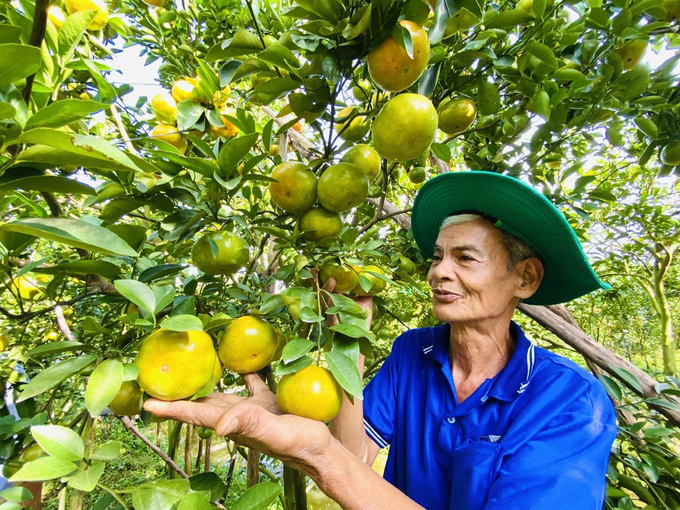
Let's help the farmers improve the value of the products they make, linking them with other cultural and social values instead of asking them to focus and organize large production right away when they do not have enough resources. Photo: Le Hoang Vu.
However, to switch from agricultural production thinking to agricultural economic thinking, farmers will need support from state agencies: (i) Dissemination and guidance on the need for product labels and product brands; (ii) Have policies to support technology transfer and brand building (both in terms of expertise and administrative procedures); (iii) Promote and trade brands and products for domestic and international markets.
Recently, the farmers and state agencies have implemented many measures to increase the value of agricultural production. To continue to help farmers make an economy from agriculture, in addition to paying attention to the input factors of production, it is necessary to continue to pay attention to the organization of production (important is the construction and issuance of codes for growing areas; building production processes for each type of crop; contract production, production with quality certification); and trade crop products (call for and support investment in preliminary processing and processing of agricultural products; build value-based production chains; seek export markets).
Let's help the farmers improve the value of the products they make, linking them with other cultural and social values instead of asking them to focus and organize large production right away when they do not have enough resources. Each farmers also needs to build responsibility and love for the crop products that they have produced instead of just chasing immediate profits.
Translated by Bao Ngoc
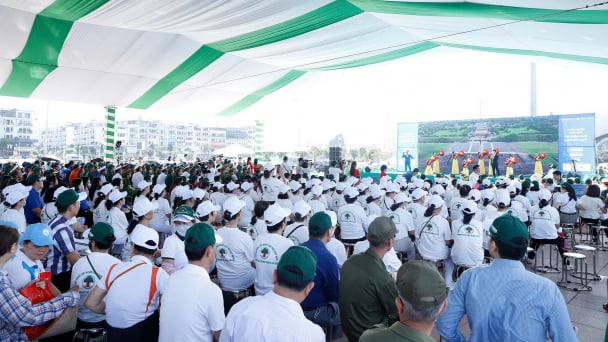
(VAN) On June 1, a grand meeting was held in Ha Long city, Quang Ninh province, to celebrate World Environment Day and launch the National Action Month for the Environment 2025.

(VAN) From the meeting in Ha Long, the United Nations called for the establishment of a legally binding global treaty to end plastic pollution.
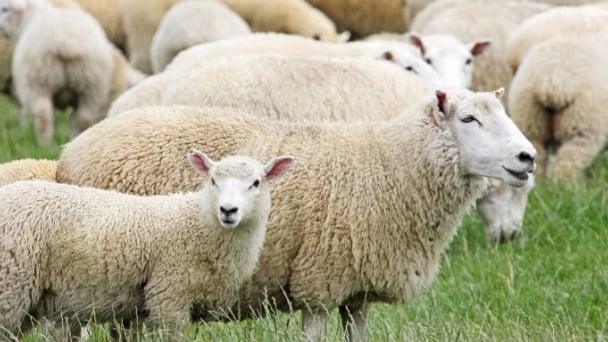
(VAN) ‘Accounting trick’ to support methane-emitting sectors undermines fight against climate change, say researchers.

(VAN) Water conservation, transboundary cooperation and sustainable agriculture are key to securing the region’s future, says FAO Director-General QU Dongyu.
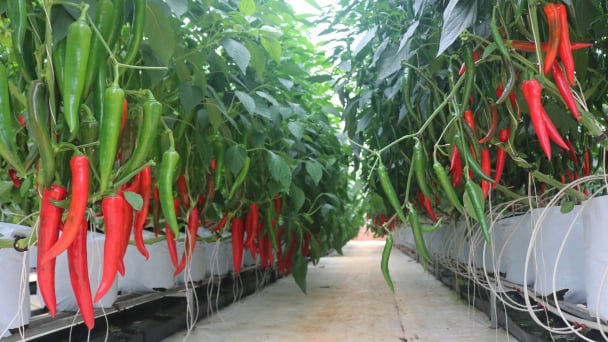
(VAN) Professor Dr. Mai Trong Nhuan believes that Lam Dong will serve as a 'supermarket' of green agricultural products for the entire country and a beautiful destination acting as a 'health charging station' for tourists.
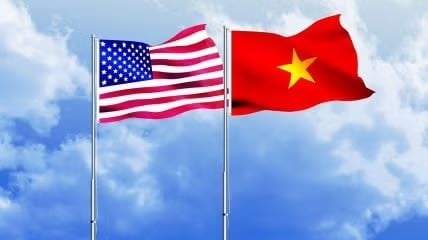
(VAN) A delegation of nearly 50 Vietnamese agencies, agribusinesses, and agricultural associations has officially begun its working trip to the United States.
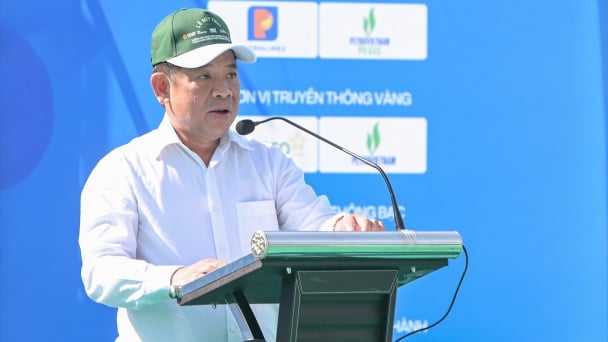
(VAN) Mr. Van Ngoc Thinh, CEO of WWF-Vietnam, warned that plastic waste is the starting point of a chain of ecological degradation and the decline of coastal livelihoods.